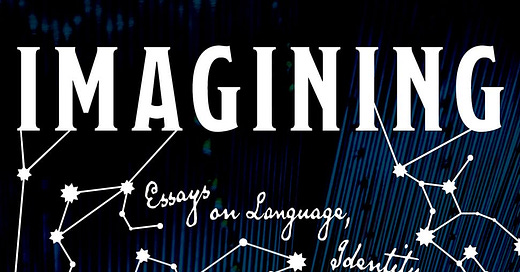Imagining Imagining: Essays on Language, Identity and Infinity by Gary Barwin
Reviewed by Aviva Rubin
Imagining Imagining: Essays on Language, Identity and Infinity is a genre-busting, super-Jewy mash-up of the Hebrew alphabet, music, poetry, philosophy, sleeplessness, dog-walking, language, body parts, ageing parents, childhood, and death. Essay is a bit of a stretch—I only agreed to review the book because of my own preconceived notion of what an essay is. If you’re looking for an introductory paragraph, an argument and a paraphrasable conclusion, this may not be for you. Barwin makes it clear that straight lines and neat outcomes are not his thing. But by the time I caught on, it was too late—I was well in, nodding, laughing and googling (Schrödinger’s cat again).
“Imagining opens with an evocative image of the left-handed author as a child, fountain pen in hand, overjoyed by the unsmudgeable Hebrew language—written right to left.”
Imagining opens with an evocative image of the left-handed author as a child, fountain pen in hand, overjoyed by the unsmudgeable Hebrew language—written right to left. Barwin provides a quick refresher on the alphabet itself: “In case it’s been a while since your bar or bat mitzvah. Or since you last read The Protocols of the Elders of Zion.” (My kind of humour.) He discusses a medieval Kabbalistic text, claiming that there is a missing letter whose sound might heal the universe. Despite his “abiding sense of tragedy, which has sustained [him] through periods of joy,” the author believes in the magical mending power of language and letters.
Over the course of the “essays,” we meet the boy who becomes the man—a child whose father takes him and his lazy eye to get glasses, tries on a number of pairs himself and hands young Gary the ones he is to get; a story of trying on jeans in a London shop and being told that “Perhaps the young gentleman is too husky for these dungarees.”; a player of saxophone, recorder, and cello; and a lover of music, in which he finds refuge, joy and possibility. In the chapter “John Coltrane Was My Bar Mitzvah Teacher,” Barwin bundles Coltrane, Charlie Mingus, Lester Young, recordings from Black churches, Johann Sebastian Bach, and the old men at synagogue chanting together—though rarely in unison—into snapshots of the world: its beauty and its imbalances. “These were big emotions that I discovered in myself through listening.” Clearly, the kid was destined for big (and little) observations.
Barwin is a seeker who understands how melody constructs home. “There was a direct sensory pleasure of the music, but there was also this objective-correlative world-building through which I attempted to construct belonging, homeland, and a sense of living in diaspora, replete with its particular and official emotions. I wasn’t just living in suburban Ottawa. I was in exile.” And yet, despite the fact that “Political turmoil seemed to follow [his] family like feathers follow a duck”—Lithuania, South Africa, Northern Ireland—Barwin ultimately complicates the notion of exile and diaspora with the Yiddish expression “The tongue is not in exile.” Meaning, no matter where we go and how much we leave behind, we bring our language—so much more than words—with us.
I loved the chapter “Sunshine Kvetches of a Little Parrot,” where the author tells jokes and talks humour—one of the “great technologies” that provides “distance and an opportunity to deal with difficult things,” functions as “socially sanctioned dissent,” humanizes and builds community. A magic salve. Even when it doesn’t work, it works. On a reading tour of China, Barwin asks his interpreter what she does with jokes. Her response: If she finds one untranslatable, she simply informs the audience and asks them to please laugh in order to respectfully acknowledge the humour. Maybe, Barwin thinks, he should do this too.
Ultimately, Barwin keeps coming back to the connections and meanings generated by layering communities and relationships through time and across difference. “I love the syncretic web of experience. Me, in 2023, a Jewish man born in Northern Ireland now listening on an iPhone in a conservation area outside Hamilton, Ontario, to a Catholic mass with music composed by a Lutheran in Leipzig in the mid-eighteenth century…” More than simply being comfortable with disorder, the author finds pleasure and purpose in it. “Transmission is a complicated tangle—a messy weave—of broken threads which includes new threads acquired along the way.” Language, he suggests, is its own internet.
In many ways, Imagining is an author’s attempt to make (non)sense of his life so far—much off-roading involved. His Yelp review provides a perfect and hilarious summary: “There was some humour in this life. There were some animals in this life, but towards the end, I got lost. I did not understand any of it. To me this life was quite good in the beginning and middle. End … lost me totally. Two stars.”
A poetic, romping work unconcerned with arriving but enthralled by what flies by, lands, crawls, and sings, Imagining takes the reader to unexpected places. It resists questions like, what am I doing here? Instead, it asks, what is here? Deep into the book, Barwin—perhaps contemplating his own life’s work—wonders about the value of art and how art is valued, arriving at books and their worth. “There may be many copies of a book,” he says, “but there is only one of us. What is ‘original’ is our experience.”
The author generously invites us to join him—and sometimes his dog, Happy—on the voyage, and in so doing creates something else of value: a unique collaboration with each new reader. Throughout our time together, I found myself thinking, How alike we are—we both prefer poppyseed hamantaschen. How different we are—who is Theseus and why should I care?
I love that.
About the Author
Gary Barwin is a writer, composer and multidisciplinary artist. He is the author of thirty books including Nothing the Same, Everything Haunted: The Ballad of Motl the Cowboy, which won the Canadian Jewish Literary Award, was shortlisted for the Vine Award and was chosen for Hamilton Reads 2023. His national bestselling novel Yiddish for Pirates won the Leacock Medal for Humour and the Canadian Jewish Literary Award, was a finalist for the Governor General’s Literary Award for Fiction and the Scotiabank Giller Prize and was long-listed for Canada Reads. His 2022 poetry collection, The Most Charming Creatures, won the Canadian Jewish Literary Award. Barwin was born in Northern Ireland of South African parents of Ashkenazi Lithuanian descent. He currently lives in Hamilton, Ontario, and at garybarwin.com.
About the Reviewer
Aviva Rubin is a Toronto-based writer of memoir, essays, social commentary and now fiction. Her writing has been featured in numerous anthologies, The New York Times, The Globe and Mail, The Toronto Star, Chatelaine, Toronto Life, Zoomer, Huffington Post, and Reader’s Digest amongst others. She is the author of the memoir, Lost and Found in Lymphomaland –– a harrowing and funny trip through a cancer diagnosis and treatment. WHITE, her debut novel, is the story of a young woman who grows up in a white supremacist family, rejects those views, then seeks to take down the movement from within — with dire consequences.
Book Details
Publisher : Wolsak & Wynn (Nov. 21 2023)
Language : English
Paperback : 192 pages
ISBN-10 : 1989496792
ISBN-13 : 978-1989496794








I absolutely love this book - so much that I've already read it twice and I doubt it'll be the last. Here's a little collection of Barwin wisdom from II that I compiled on my own blog: https://theprairiemaritimer.com/imagining/